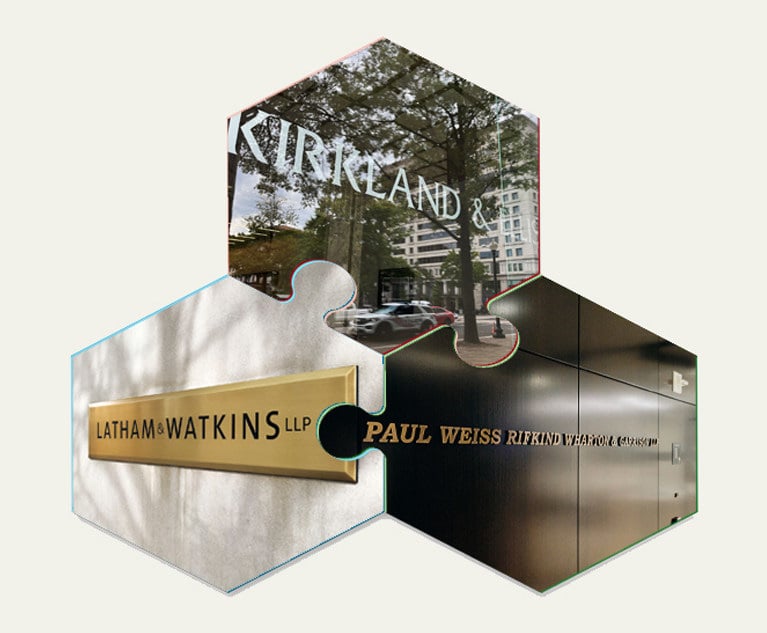Easily Distracted? Maybe You Shouldn't Be a Lawyer.
Has it occurred to you that you have no business being a lawyer in the first place?
January 22, 2020 at 04:56 PM
4 minute read
 Photo: Shutterstock
Photo: Shutterstock
Maybe it's you. And not the firm.
Of course, there are jerks galore in Big Law who make your job unnecessarily stressful. God knows there are unpleasant, greedy, beady-eyed fellows at every corner of every firm in America.
 We all know the type, and nobody ever said being a lawyer was a pleasant experience. But has it occurred to you that you have no business being a lawyer in the first place? Besides having a hard shell, you need something more fundamental to be a successful lawyer: a preternatural ability to focus on details that would drive a lot of people crazy. In other words, maybe some personality types simply shouldn't be lawyers.
We all know the type, and nobody ever said being a lawyer was a pleasant experience. But has it occurred to you that you have no business being a lawyer in the first place? Besides having a hard shell, you need something more fundamental to be a successful lawyer: a preternatural ability to focus on details that would drive a lot of people crazy. In other words, maybe some personality types simply shouldn't be lawyers.
I'm bringing this up because the Harvard Business Review recently featured an article about productivity in the digital age of constant distractions. The upshot was that some people are just prone to distraction and should consider careers that make the most of that trait.
Let me say that the article strikes home: I was a miserable little lawyer once upon a time, and I clearly didn't have the attention span to stay in the profession for the long haul. For my entire legal career—and years later—I felt guilty and unworthy because I couldn't get excited about loan documents, arcane securities regulations or other fine points of corporate law. Instead of immersing myself in the Securities Act, I was secretly perusing my stash of newspapers, magazines and even catalogs (yeah, this was pre-internet) in my office.
So here's to my kindred spirits: Celebrate your attention deficit. In HBR, Tomas Chamorro-Premuzic, the chief talent scientist at ManpowerGroup, writes that "it is useful to remember that distractibility has the potential to enhance curiosity and creativity: the less seemingly irrelevant information you filter out or censor, the more original and unusual your ideas and inventions may be."
A "better antidote," writes Chamorro-Premuzic, is to find a career that "provides the right amount of distractions for your natural temperament or personality." He offers four options that "may benefit from higher levels of mind wandering and distractibility:"
- Entrepreneur. You know what this is: Open a bake shop. Become a personal trainer, career coach, Feng Shui expert. Whatever.
- PR/Media production. The beauty of this job is that you'll get to work with all types of businesses. What's required is that you "absorb and synthesize vast amounts of information, filtering out as little as possible, and turning distractions into the raw materials of their content and stories." In other words, you can be shallow!
- Consultant. This is supposed to require skill. But "note that while expertise is the dominant currency in consulting, what you know is less important than what you are willing to learn." Translation: Fake it.
- Journalist. For those with a hyperactive mind, journalism is the "final option." It actually combines all the other three careers: "You need to brand and sell yourself like an entrepreneur, you need to be always open and reactive to the news and real-world events, and you need to be able to switch from one topic to another, always exploring new questions."
I don't know whether I should be proud or embarrassed but I've had all four of the above careers—and I'm still searching for the ideal career. But considering that I've been a journalist for almost 20 years—by far my longest gig—I guess I've learned to deploy my weakness into a paying gig. (I was a lawyer for five years, but who's counting?)
Which is to say that if you're miserably cast as a lawyer, you shouldn't give up hope that something's out there where your scattered, distracted mind might be an asset. That said, I'm not advocating anyone become a journalist, especially if you're used to the perks of a Big Law salary.
But that's another topic for another day.
Contact Vivia Chen at [email protected]. On Twitter: @lawcareerist.
NOT FOR REPRINT
© 2025 ALM Global, LLC, All Rights Reserved. Request academic re-use from www.copyright.com. All other uses, submit a request to [email protected]. For more information visit Asset & Logo Licensing.
You Might Like
View All

Letter from Asia: As American Firms Retreat, Will Loyal UK Firms Regain Market Share In Asia?


Change Is Coming With the New Trump Era. For Big Law, Change Is Already Here
6 minute readTrending Stories
- 1Munger, Gibson Dunn Billed $63 Million to Snap in 2024
- 2January Petitions Press High Court on Guns, Birth Certificate Sex Classifications
- 3'A Waste of Your Time': Practice Tips From Judges in the Oakland Federal Courthouse
- 4Judge Extends Tom Girardi's Time in Prison Medical Facility to Feb. 20
- 5Supreme Court Denies Trump's Request to Pause Pending Environmental Cases
Who Got The Work
J. Brugh Lower of Gibbons has entered an appearance for industrial equipment supplier Devco Corporation in a pending trademark infringement lawsuit. The suit, accusing the defendant of selling knock-off Graco products, was filed Dec. 18 in New Jersey District Court by Rivkin Radler on behalf of Graco Inc. and Graco Minnesota. The case, assigned to U.S. District Judge Zahid N. Quraishi, is 3:24-cv-11294, Graco Inc. et al v. Devco Corporation.
Who Got The Work
Rebecca Maller-Stein and Kent A. Yalowitz of Arnold & Porter Kaye Scholer have entered their appearances for Hanaco Venture Capital and its executives, Lior Prosor and David Frankel, in a pending securities lawsuit. The action, filed on Dec. 24 in New York Southern District Court by Zell, Aron & Co. on behalf of Goldeneye Advisors, accuses the defendants of negligently and fraudulently managing the plaintiff's $1 million investment. The case, assigned to U.S. District Judge Vernon S. Broderick, is 1:24-cv-09918, Goldeneye Advisors, LLC v. Hanaco Venture Capital, Ltd. et al.
Who Got The Work
Attorneys from A&O Shearman has stepped in as defense counsel for Toronto-Dominion Bank and other defendants in a pending securities class action. The suit, filed Dec. 11 in New York Southern District Court by Bleichmar Fonti & Auld, accuses the defendants of concealing the bank's 'pervasive' deficiencies in regards to its compliance with the Bank Secrecy Act and the quality of its anti-money laundering controls. The case, assigned to U.S. District Judge Arun Subramanian, is 1:24-cv-09445, Gonzalez v. The Toronto-Dominion Bank et al.
Who Got The Work
Crown Castle International, a Pennsylvania company providing shared communications infrastructure, has turned to Luke D. Wolf of Gordon Rees Scully Mansukhani to fend off a pending breach-of-contract lawsuit. The court action, filed Nov. 25 in Michigan Eastern District Court by Hooper Hathaway PC on behalf of The Town Residences LLC, accuses Crown Castle of failing to transfer approximately $30,000 in utility payments from T-Mobile in breach of a roof-top lease and assignment agreement. The case, assigned to U.S. District Judge Susan K. Declercq, is 2:24-cv-13131, The Town Residences LLC v. T-Mobile US, Inc. et al.
Who Got The Work
Wilfred P. Coronato and Daniel M. Schwartz of McCarter & English have stepped in as defense counsel to Electrolux Home Products Inc. in a pending product liability lawsuit. The court action, filed Nov. 26 in New York Eastern District Court by Poulos Lopiccolo PC and Nagel Rice LLP on behalf of David Stern, alleges that the defendant's refrigerators’ drawers and shelving repeatedly break and fall apart within months after purchase. The case, assigned to U.S. District Judge Joan M. Azrack, is 2:24-cv-08204, Stern v. Electrolux Home Products, Inc.
Featured Firms
Law Offices of Gary Martin Hays & Associates, P.C.
(470) 294-1674
Law Offices of Mark E. Salomone
(857) 444-6468
Smith & Hassler
(713) 739-1250










